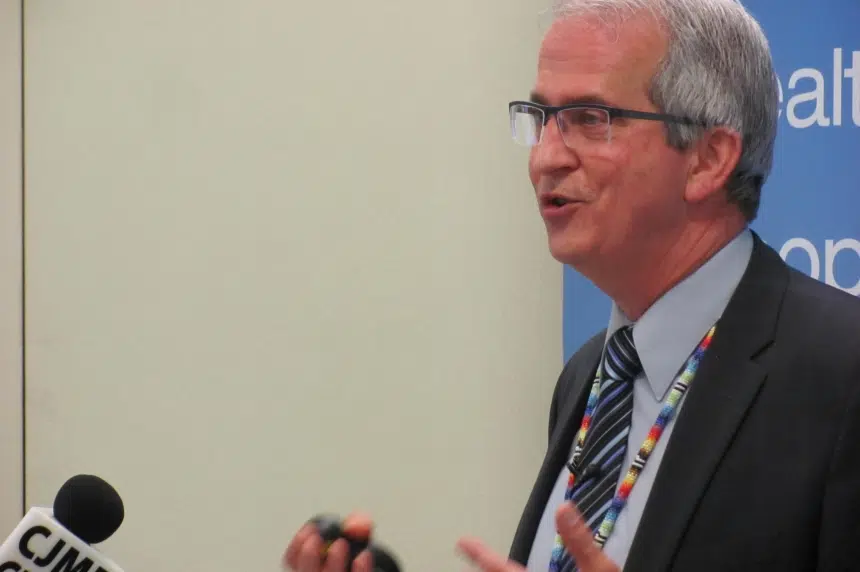Despite carrying a deficit for the past four years, the Regina Qu’Appelle Health Region is hoping this is the year it can get healthy again and balance the budget.
Last year the region spent $15.2 million over budget, adding to the region’s carried debt to bring it to a total of $145 million.
The region will have to rein in its spending to not add to that further, and it will be relying on extra money from the province and “efficiencies” to do it.
Keith Dewar is the CEO of the RQHR, he’s confident the health region will work hard toward those savings.
At this point the region is projecting a balanced budget. It will be spending about $1.04 billion this year. Dewar is happy with the increase in funding from the province which is up 3.5 per cent to $936 million. The region got $17.8 million to address collective bargaining increases. It was also given nearly $9.3 million in inflation funding, which Dewar said will be important in helping to balance the budget.
“I think (balancing the budget) is much more doable than it was without that $10 million.”
CUTTING DOWN
The region is planning to spend about $12 million less than last year. To control spending it’s taking out the scalpel, throwing itself into deficit reduction initiatives, a big chunk of which are productivity improvements.
The region expects those improvements to save $10.7 million through things like reducing sick time, orientation, and overtime, and “optimizing use of our people resources” which includes matching capacity and effective management of work units.
Dewar said they wouldn’t have been able to get to that number without the focus on continual improvement, referring to the controversial LEAN program.
“LEAN is an integral part of the continuous improvement work that we’re doing.”
When comparing expenses from the past fiscal year to the current one the only reduction is in salaries and benefits, which is down approximately $19.4 million.
Dewar said the region is committed to not laying people off to save money. He said they’re doing things like looking at how and where the 16 million hours of work are spent in the health region.
MORE FOR FRONT-LINE
A bit of a wrench was thrown into the health region’s planning this year because the province is requiring the RQHR to move $1,464,000 from administration into frontline spending for long term care.
On Wednesday, Dewar said the region still doesn’t know where all that money is going to come from. He said 70 per cent of it will be taken out of budgeted salaries, and they’re trying to find positions which can stay vacant, and opportunities to realign work.
PROBLEMS IN THE WAY
The reduction in administration was highlighted by the RQHR as a possible problem in getting to that balanced budget.
Another problem is the inability to reduce paid work hours due to complex environments in the region. Last year the region didn’t manage to achieve its targets for compensation reductions, and the risk of that happening again this year is high.
A big pressure the health region has had to deal with over the last several years is Saskatchewan’s population boom. Tens of thousands more people now live in the health region, and it’s had to provide services to those people with fewer resources. That’s a problem Dewar said they’re working on but haven’t been able to fix yet.
“We have people waiting in emergency that we wish weren’t, we’ve got people being served off-service [treated in a different area than they normally would be], we’ve got our wait times in surgery growing as well.”
CAPITAL PROJECTS
The hospital is projecting a surplus of about $543,000 in capital spending this year thanks to money carrying over from previous years. The biggest project being undertaken there is the electrical upgrade for Regina’s hospitals at a cost of $6.1 million. Dewar said it’s important because the electrical systems are at the point right now where they could shut down any time.

Regina Qu'Appelle Health Region hoping to cure budget woes
By Adriana Christianson
Jul 21, 2016 | 6:15 AM
Discover more on CJME.com
MoreOPINION


Murray Wood says Saskatchewan Roughrider fans don't get to celebrate a Grey Cup win all that often, so when we do, it's ...

Sarah Mills: After 12 years, the Saskatchewan Roughriders win it all
It might have been nerve-wracking in the end, but the 2025 Grey Cup belongs to the Saskatchewan Roughriders. Sarah Mills...
LATEST WEATHER
TODAY ON EVAN BRAY


The Evan Bray Show - Monday, Nov. 17
The Riders are coming home with the Grey Cup after 12 long years! Evan recaps the highlights with Jamie Nye! It's Movemb...






